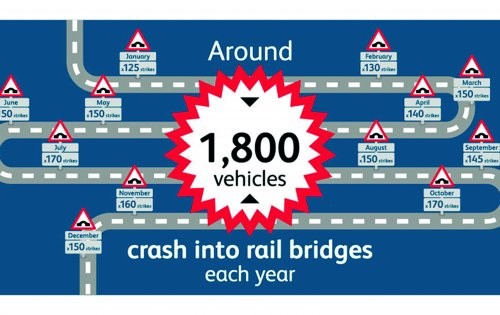Following a concerning number of bridge strike incidents across the PSV and HGV sectors recently, the Traffic Commissioners have taken steps to remind operators and drivers of the law and potential consequences.
The number of bridge strike incidents in the UK is described as ‘alarmingly high,’ with 1,624 incidences on the Network Rail infrastructure alone in 2020-21, along with many more incidences of commercial vehicles using inappropriate routes, including not complying with weight limits which can result in damage to roads, congestion and risks the safety of other road users.
In a recent communication, the Traffic Commissioners reminded operators that in addition to the potentially catastrophic road safety issues, there are serious financial implications to these incidences and that the impact on drivers and operators can also be significant. The communication cited an example from the HGV sector, in which a vehicle struck a bridge in St. Helens. A public inquiry concluded that the primary cause of the incident was the driver’s failure to carry out his responsibilities in a professional manner. His HGV licence was revoked, and he was disqualified from holding an HGV licence for six months. The TC also noted that the operator could have done more to prevent the incident and the operator found its O-licence permanently curtailed.
One of the reasons blamed for these incidents is poor route planning and the reliance on inappropriate satnav systems, which lack commercial functionality to warn the driver of all the critical points on routes. The Traffic Commissioners’ document stated that whilst satnav technology can be employed effectively and efficiently, the devices used must be fit for a commercial role, adding that good satnav devices should regularly be updated with up-to-date information on the road network, including height restrictions.
Having suitable satnav equipment is not a substitute for effective route planning, the TCs warned, but said it may assist the driver to avoid some of the incidents,. The Commissioners expect both operators and drivers to treat the issue seriously and take responsibility, warning that failure to do so could lead to an operator or driver having to appear before a TC or public inquiry.


